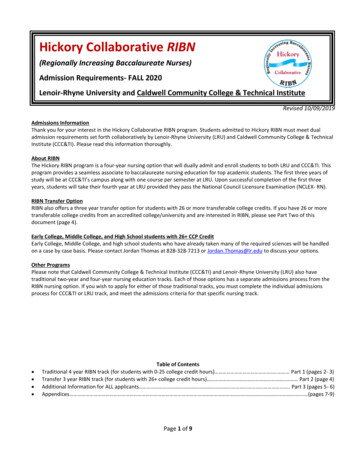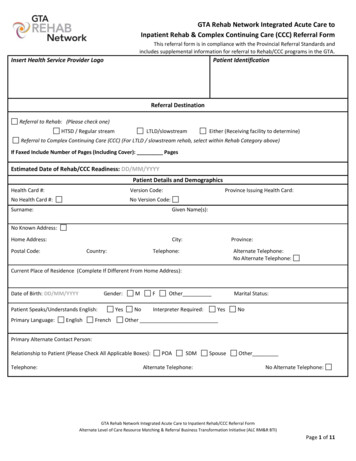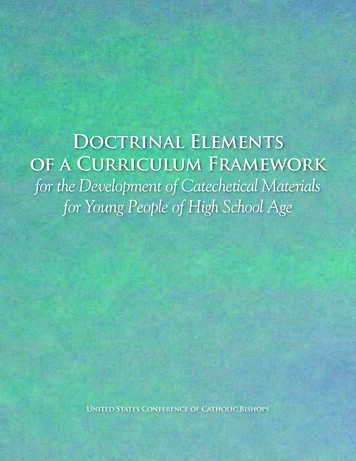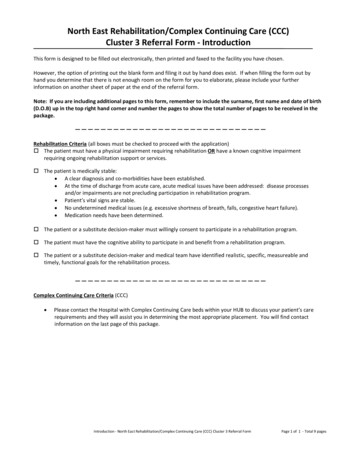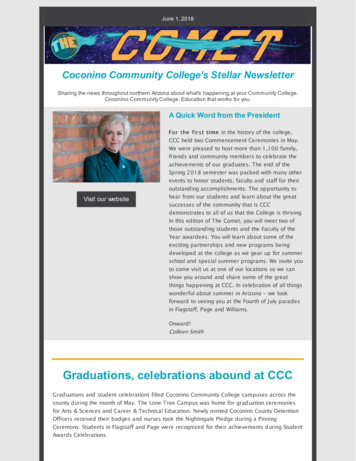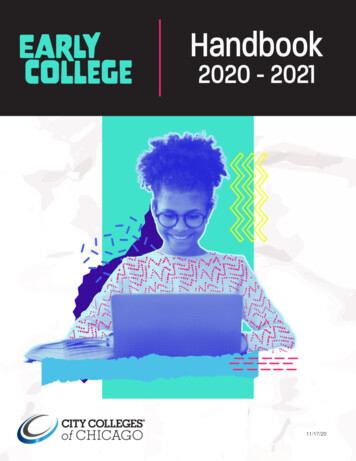
Transcription
11/17/20
CITYCOLLEGESOFCHICAGOSECTION 1:IntroductionWelcome MessageThis is a comprehensive Early College Manual intended for students and parents, high schoolteachers, counselors and administrators, CCC faculty and administrators, and other interestedparties. City Colleges of Chicago and Chicago Public Schools (CPS) are working closelytogether to create a seamless path to college for Chicago students, and the Early CollegeInitiative gives high school students access to college courses before high school graduation.The information in this handbook provides details about the program, including eligibilityrequirements, how to enroll, communication expectations, benefits and considerations, andmore.Handbook 2020 - 20211
CITYCOLLEGESOFCHICAGOCity Colleges of Chicago MissionCity Colleges of Chicago (CCC) delivers exceptional learning opportunities and educationalservices for diverse student populations in Chicago.We enhance knowledge, understanding, skills, collaboration, community service and life-longlearning by providing a broad range of quality, affordable courses, programs, and services toprepare students for success in a technologically advanced and increasingly interdependentglobal society.We work proactively to eliminate barriers to employment and to address and overcome casualfactors underlying socio-economic disparities and inequities of access and graduation in highereducation.City Colleges of Chicago Early College MissionThrough a tuition-free program, City Colleges of Chicago provides opportunities for qualifyingChicago students to access and complete college coursework prior to high school graduation.Robust supports are provided to create an environment where students can thrive and gainconfidence in their ability to access and complete a college degree.Core Values: We promote academic integrity and academic success while working in collaborationthrough shared governance with CCC faculty and staff.We support equity, access, and achievement while working in collaboration with parentsand staff at Chicago Public Schools.We advise and monitor student outcomes to ensure continuous improvement ofprogrammatic guidelines.Handbook 2020 - 20212
CITYCOLLEGESOFCHICAGOMeet the Early College Staff:CCC LOCATIONCOORDINATORSEMAILPHONE NUMBERFAX NUMBERDaley CollegeRaeann GistRgist2@ccc.edu773-838-7729773-838-7605Harold WashingtonCollegeKim edy-KingCollegeBrianna lm X CollegeJesus ve-HarveyCollegeHolly n CollegeErika ght CollegeMila 1-8817District ProjectManagerKathy ratorCarmen Garthcgarth@ccc.edu312-553-2671District DirectorShavon TaylorStaylor142@ccc.edu312-553-3483What is Early College?Early College consists of opportunities, through both Dual Credit and Dual Enrollment, for highschool students to earn college credits before they graduate from high school. Per the DualCredit Quality Act, the goals of Early College are:1. To reduce college costs.2. To speed time to degree completion.3. To improve the curriculum with college and workplace expectations.4. To facilitate the transition between high school and college.5. To enhance communication between high schools and colleges.Handbook 2020 - 20213
CITYCOLLEGESOFCHICAGO6. To offer opportunities for improving degree attainment for underserved studentpopulations.Dual Credit is defined as an instructional arrangement where an academically qualified highschool juniors and seniors enroll in a college-level course and, upon successful coursecompletion, concurrently earn both college and high school credit. In most cases, Dual Creditcourses are taught in high schools during students’ regular school day by a qualified high schoolteacher. Other options include courses being taught at the high school with a college instructor,or a course offered at another location, but not on the college campus.There are standards that must be adhered to for Dual Credit to ensure that the quality and rigorof the courses match courses taught on the college campus. These standards align with theDual Credit Quality Act:1. Instructors teaching credit-bearing college-level courses for dual credit must meet the sameacademic credential requirements as faculty teaching on campus, with the exception ofthose that quality for the Professional Development plan (see SECTION 4: of this document:High School Dual Credit Teachers) (see CCC Credentialing Guidelines).2. Instructors in career and technical education courses must possess the credentials anddemonstrated teaching competencies appropriate to the field of instruction.3. Students must meet the same academic criteria as those enrolled in credit-bearing collegecourses, including taking appropriate placement testing. Thus, no mixed-classes areallowed.4. Course content must be the same as that required for credit-bearing college courses.5. Learning outcomes must be the same as for credit-bearing college courses and beappropriately measured, following the assessment practices of the department or disciplinewithin the College.6. Assessment methods and course exit instruments should be consistent with those of the oncampus courses offered by the college.7. Institutions shall provide high school instructors with an orientation in course curriculum,assessment methods, and administrative requirements before high school instructors arepermitted to teach dual credit courses.8. Dual credit instructors must be given the opportunity to participate in all activities available toother adjunct faculty, including professional development, seminars, site visits, and internalcommunication, provided that such opportunities do not interfere with an instructor's regularteaching duties.9. Every dual credit course must be reviewed annually by faculty through the appropriatedepartment to ensure consistency with campus courses.Handbook 2020 - 20214
CITYCOLLEGESOFCHICAGOFor more information on Dual Credit, please refer to the Dual-Credit-Fact-Sheet-3.19.18.pdf.Dual Enrollment is defined as an instructional arrangement where an academically qualifiedjunior or senior who is enrolled in high school also enrolls in a college level course on a collegecampus. Upon successful completion of the course, the student earns college credit with thepossibility of also earning high school credit, based on the high school’s approval. All sevenCity Colleges of Chicago provide Dual Enrollment opportunities for high school students.To see more information on eligibility requirements for students for Early College opportunities,please see SECTION 2: Early College Students and Parents.Who are our Early College Students?City Colleges of Chicago and Chicago Public Schools have worked collaboratively to provideEarly College opportunities to students, and we’ve grown steadily over the years. Our EarlyCollege students are largely successful in passing their coursework with a C or better.Additionally, we have Early College students of many races, but Hispanic and Black studentscomprise the largest populations of Early College students.Unduplicated* Early College Enrollment by FY15DUAL CREDITFY16FY17FY18FY19DUAL ENROLLMENTThis chart shows that our Early College enrollment has increased substantially, especially forDual Credit courses. The term unduplicated* means that each student counts only once, even ifthey take more than one Early College course within one year.Handbook 2020 - 20215
CITYCOLLEGESOFCHICAGOFY18 Credit Course Success Rates by EarlyCollege Program Compared to Non -Early on Early CollegeDual EnrollmentDual CreditSuccess RatesThis chart shows that Dual Credit and Dual Enrollment students outperform traditional CCCstudents in their course success rates. Course success is determined by passing a course withthe grade of C or better.FY18 Unduplicated*Early College Enrollment by 15345128066WhiteAsianMulti-racialNot specified0HispanicBlackDUAL CREDITDUAL ENROLLMENTThis chart shows the race of students participating in Early College coursework. The termunduplicated* means that each student counts only once, even if they take more than one EarlyCollege course within one year.Handbook 2020 - 20216
CITYCOLLEGESOFCHICAGOWhat kind of courses are available for Early College?According to the Illinois Community College Board (ICCB) Administrative rules, courses for DualCredit and/or Dual Enrollment should be selected from transfer courses that have beenarticulated with senior institutions in Illinois or from the first-year courses in ICCB approvedAssociate in Applied Science degree programs. At City Colleges, we have over 150 coursesthat have been designated as Illinois Articulation Initiative (IAI) courses, which is an agreementwith over 100 participating colleges and universities in Illinois that courses with this designationare transferrable between these institutions. In addition to these IAI courses, there are othercareer-focused courses that are also great choices for Early College coursework.Handbook 2020 - 20217
CITYCOLLEGESOFCHICAGOSECTION 2:Early College Students andParentsEligibility Requirements for Early College (Dual Credit-DC andDual Enrollment-DE)1. Students must have junior or senior standing to be eligible for DC/DE course(s).2. Students under age 16 can participate if they are enrolled in high school and obtain theapproval of the College President or Vice President to enroll in a DC/DE college creditcourse, per Academic and Student policy.Handbook 2020 - 20218
CITYCOLLEGESOFCHICAGO3. Home school students are permitted to enroll in DE courses. Home school students musthave a valid form of ID to verify city of Chicago residency, be 16 years old, and haveparental permission.4. Students must meet all prerequisites of the course prior to enrollment. If under the age of16, students only qualify for enrollment in college courses that require Math or Englishcourse prerequisites and receive permission to enroll from the College President (seePrerequisite Qualifications for more information).Chicago Public Schools students must have: a minimum cumulative GPA of 2.5 or higher on the high school transcript or most recentreport card90% attendance rate for the last academic year, or a recommendation letter from highschool official if the GPA and attendance rate is below the CPS requirementssigned permission from the CPS high school administrator/counselorPrerequisite Qualifications1. Certain CCC courses require students to meet college-readiness standards. Students whowish to take these courses must meet the college-readiness standard prior to enrolling bysatisfying either the SAT/ACT benchmark/s or the required placement test score.a) To meet college readiness standards by SAT scores, students must score a 480 orabove on the evidence-based Reading and Writing portion of the SAT and a 530 forMathematics.b) To meet college readiness standards by ACT scores, students must score a 19 orabove in English and a 21 or above in Math.Handbook 2020 - 20219
CITYCOLLEGESOFCHICAGO2. If students do not meet the placement standards based on SAT or ACT scores, students willtake City Colleges of Chicago (CCC) Placement Exams. For more information on CCCPlacement Exams, please see section City Colleges of Chicago Placement Exams and visitCCC Placement Exams .a) ENG 101 and courses requiring ENG 101 eligibility require a score of 6 on the Readto-Write English placement exam.b) College-level math requires a score of 46 or higher on the ALEKS Math placementexam.Additional Information Students must provide current high school ID, valid IL state identification, or IL driver’slicense.Dual Enrollment students are eligible to take one class per semester at one CCCcampus. Parents and students are responsible for tuition and fees for additional coursesbeyond the one per semester that is allotted through Early College.Dual Enrollment students may not self-enroll into any course and must meet with theircampus’s Early College Coordinator prior to course selection.Dual Credit students are eligible to take up to four dual credit classes per semester attheir high school. Students cannot exceed 29 Dual Credit credit hours throughout theirhigh school career.Continued Eligibility1. Students must pass the course with a “C” or better to remain eligible to participate in DualCredit/ Dual Enrollment.2. Students who receive a WTH (withdraw), ADW (administrative withdraw) and/or NSW (noshow withdraw) are no longer eligible to participate in DC/DE.3. Students who elect to withdraw from a DC/DE course before the statistical date will remaineligible to participate in DC/DE. The Statistical (STAT) Date is based on the length of theclass but is typically 7 calendar days after the class start date for a 16-week class.Handbook 2020 - 202110
CITYCOLLEGESOFCHICAGO4. A student whose Early College eligibility has been revoked may be reinstated into the EarlyCollege program by:a) repeating a previously enrolled Early College course in which he/she earned a finalgrade of “D” or “F,” received an NSW or ADW, or from which they withdrew (WTH).b) successfully completing the course with a final grade of “C” or higher.c) students are responsible for paying the full cost of tuition and any other chargesassociated with the repeated course.5. Graduating HS seniors are not eligible for dual enrollment courses in the summer followingtheir senior year. (Exception: A student may be eligible for Work Hard Play Hard and receiveone free summer course at CCC if the student enrolls in the fall term following theirgraduation.)Applications and Admissions Process for both Dual Credit and/orDual Enrollment1. Students should discuss with parents, high school counselor, and CCC early collegecoordinator their interest in dual enrollment/credit.2. Students should attend an information session at the CCC campus of choice; informationsession schedules are found here: http://www.ccc.edu/earlycollege.3. Students should determine if placement tests are needed or if eligibility can be determinedby SAT/ACT scores. If needed, students take appropriate placement tests (CCC Placementtests can be taken at the high schools—please schedule in consultation with the HScounselor).4. Students submit Placement Test Scores to High School Counselor and Early CollegeCoordinator.5. With the help of their counselor, students apply to City Colleges of Chicago atwww.ccc.edu/apply and select: I am a Dual Credit/Dual Enrollment Student.6. Students submit a completed Application Packet to the Early College Coordinator at thepartner CCC campus (see Appendix for Dual Credit Application Packet and DualEnrollment Application Packet).7. For Dual Enrollment, students must consult Early College Coordinator to order textbook forloan throughout the course. Students also have the option to purchase the book on theirown, rather than participate in the loan process.8. For Dual Credit, high school counselors will order textbooks for courses.Handbook 2020 - 202111
CITYCOLLEGESOFCHICAGO9. Students should confirm course selection with the Early College Coordinator and receive theStudent Study list.10. Dual Enrollment students must obtain a CCC photo ID at the appropriate college campus.Dual Credit students may come to campus to obtain an ID so that they can access campusresources.11. Students should access the Student Portal at my.ccc.edu to monitor enrollment status andto receive pertinent information and updates each term.12. Students should communicate with faculty, high school counselor, and Early CollegeCoordinator with any questions or concerns along the way.City Colleges of Chicago Placement ExamsAll students must consent to the CPS-CCC Data Sharing Agreement prior to placement tests sothat scores may be shared.When registering for courses that require college-level English or math placement, all studentsmust meet the placement standards prior to enrolling. The following table shows the minimumscores required for college credit placement.CCC Placement TestExamScoreCollege Credit PlacementRead to Write (RTW)6English 101ALEKS46 Math 118, 121, 125,140, 143ACT & SAT English Placement ScoresACT English ScoreSATPlacement Level21 480 English 101ACT Math ScoreSAT Math Score21-23530-570Handbook 2020 - 2021Mathematics CoursePlacementMath 118, 121, 125,140, 14312
CITYCOLLEGESOFCHICAGORead to Write (RTW) English Placement TestCity Colleges of Chicago requires the Read to Write Placement Test for all incoming studentswho do place by virtue of their SAT or ACT scores (see FAQ for more information). This testwas designed by CCC faculty, and student tests are evaluated and scored by CCC faculty.RTW helps faculty determine student preparedness in reading and writing. English Faculty usethe Read-to-Write Placement Test to place students into the appropriate English courses thatwill best promote academic success, and to determine eligibility for other courses new studentscan take in their first semester at college.This test is not pass/fail; rather there is a range of scores which help determine the best courseplacement for students. Taking this test seriously can prevent students from wasting both timeand money by placing students into classes that may not be needed. Therefore, before takingthe test, students should read through the Read to Write Test Prep Materials to ensureunderstanding of the process and expectations of the test. Preparation materials are providedthat clearly outline expectations and how the tests will be scored. It is also important to note thatthis test is timed and must be completed in one sitting. Logging in and out during the test is notallowed.The test has several components to complete. Each portion of the test must be completedwithin an allotted time of 2.5 hours. Students will respond to short answer questions to help CCC better understandstudents’ academic, demographic, and personal background.Students will then read a short passage.Students will complete five multiple choice reading comprehension questions based onthe reading passage.Students will write a multi-paragraph essay in response to this passage.Students will read the course descriptions and write a short paragraph explaining theEnglish level they believe is the best fit for them.Additional RTW Testing Notes1. RTW is taken online in a single sitting with a maximum time limit of 2.5 hours.2. If a student logs out or closes the browser before submitting the test, they will notbe able re-start the test – it will be locked.Handbook 2020 - 202113
CITYCOLLEGESOFCHICAGO3. Students need to submit the test at the end of the last section.4. Students can take RTW once per City College semester – twice per year – whichmakes it extremely important for students to adequately prepare before takingthe test.ALEKS Mathematics Placement TestCity Colleges of Chicago uses an ALEKS mathematics placement assessment to determinereadiness for various mathematics courses. The ALEKS Placement Assessment coversmaterial from Basic Math through Pre-calculus and will take approximately 90 minutes tocomplete. After the assessment, a targeted Prep and Learning Module is available for studentsto review and learn material, and to improve placement and eventual course outcomes.All students are strongly encouraged to spend several hours using the ALEKS Prep andLearning Module. Even if students have achieved placement in their desired course, time spentin ALEKS will better prepare students for their upcoming course and ultimately lead to bettergrades.This is not a pass/fail type of test. Rather, it is an assessment that helps City Colleges find thebest course fit for students. At the end of the ALEKS Placement Assessment, students have amuch better sense of their strengths and weaknesses in math. Students will then have a chanceto work on those weaknesses by being placed in the appropriate level course. There is really nopenalty for incorrectly answering a question on the assessment. The most important focus isthat students take the assessment seriously and give it an honest effort so that the assessmenttruly reflects students’ level of knowledge and math preparedness.Please read the ALEKS FAQ for more information.Additional ALEKS Testing Notes1. ALEKS PPL provides an online platform combining preparation and learning withup to five test attempts.2. From the first time a student logs in they have access to their account for oneyear.3. Once they begin working in the preparation and learning module, they haveaccess to those resources for six months.4. During that time, students should take full advantage of them prior to each testattempt.5. ALEKS PPL may be taken up to five times.Handbook 2020 - 202114
CITYCOLLEGESOFCHICAGO6. There is a mandatory 24 hour wait time between attempts.7. Three to five hours of preparation and learning module work are requiredbetween attempts beyond the second.8. The more time students spend working in the preparation and learning module,the higher the likelihood they will test eligible for dual credit/dual enrollmentcourses.Retest PolicyStudents may re-take the CCC placement tests every term. Retesting is appropriate when thereis reason to believe that a score obtained from previous testing does not accurately reflect theexaminee’s true level of knowledge or skill. Typically, retesting is appropriate in two situations: When factors other than the examinee’s ability are believed to have influenced theprevious testing, orWhen the scores obtained from earlier testing are no longer believed to reflect thestudent’s current abilityStudent must retest if their test scores have expired, i.e., after 12 months have elapsedfollowing a previous CCC Placement Test and prior to beginning a sequence of courses in thatsubject.FERPA And Data ConsentThe Family Educational Rights and Privacy Act (FERPA) (20 U.S.C. § 1232g; 34 CFR Part 99)is a Federal law that protects the privacy of student education records. FERPA gives parentscertain rights with respect to their children’s education records. This includes the right toinspect and review education records, to have education records amended in certaincircumstances, and to consent to the disclosure of education records. These rights transferto the student when he or she reaches the age of 18 or attends a school beyond the highschool level. Students to whom the rights have transferred are "eligible students."Disclosures to parents and rights of students. (Sect. 99.5)All rights of parents under FERPA transfer to the student once the student has reached 18years of age or attends a postsecondary institution (and thereby becomes an “eligiblestudent”). Therefore, all dual credit participants are “eligible students” as defined byFERPA.Handbook 2020 - 202115
CITYCOLLEGESOFCHICAGOHowever, current regulations also provide that even after a student has become an “eligiblestudent,” postsecondary institutions may allow parents to have access to their child’seducation records, without the student’s consent, in the following circumstances: The student is a dependent for Federal income tax purposes (§ 99.31(a)(8)); The disclosure is in connection with a health or safety emergency, The student has violated any law, rule or policy governing the use or possession ofalcohol or a controlled substance.For more information on FERPA, please contact an Early College Coordinator.City Colleges of Chicago and Chicago Public Schools are jointly committed to students’success. Most students who take Early College courses do well. But there are consequencesfor not being successful in Early College that students must take into consideration. Success isdetermined by completion of a college course with a grade of C or better.Important Considerations for Early College enrollmentBenefits:Earn college credits for free and get an early start towards college completion.a) This will save time and money in the future.b) It helps build students’ confidence in their abilities to succeed as college students,thus increasing chances of enrolling in college after graduating from high school.c) Course options are varied and taking coursework of interest could help studentsdetermine their major early on.d) Successfully completing college coursework while still in high school will help buildan impressive credential for scholarship applications. This shows a high degree ofseriousness about earning a college degree and that students have taken theinitiative to get started early.Consequences for course failures and/or withdrawal:a) These courses are a part of students’ academic transcripts. Having a failing gradewill mean starting college from a deficit and a lower GPA.b) Failing a course or withdrawing from a course after the first week of class couldcause a Satisfactory Academic Progress (SAP) hold to be placed on a students’Handbook 2020 - 202116
CITYCOLLEGESOFCHICAGOaccount. This has a negative impact on future financial aid awards and students’ability to register for subsequent courses. For more information about SAP, pleasesee Section 6.6 of the CCC Academic and Student Policy Manual.c) Students who fail the college course will also earn a failing grade in thecorresponding high school course for Dual Credit and some Dual Enrollmentcourses. For this reason, students should be carefully advised before enrolling andshould be advised early in the semester about their progress in the college course.Students who are at risk for failing the college course may be advised to considerwithdrawing.d) Students who show significant attendance problems can be withdrawn from thecourse without consultation, so students need to commit to attending all classes,except in the cases of true emergencies. This policy is referred to as AdministrativeWithdrawal (ADW). A student can receive an ADW at midterm if the instructordetermines that the student is not actively pursuing completion of the course, basedon the instructor’s published criteria for academic pursuit in the syllabus. For moreinformation on ADW, please see CCC Academic and Student Policy Manual.e) For more information about what to do if students are struggling, see Section 2: EarlyCollege Students and Parents.Which is a better option? Comparing and Contrasting Dual Creditand Dual EnrollmentStudents can take both Dual Credit and Dual Enrollment at the same time or separately. DualEnrollment students are eligible to take one class per semester at one CCC College. DualCredit students are eligible to take up to 12 credit hours classes per semester at their highschool.Both Dual Credit and Dual Enrollment have wonderful benefits, but students must decide whichfits best with their lives and schedules. Here are some things to consider: Dual Credit is very convenient because it is taught in the high school during the schoolday, which won’t add time outside of students’ academic schedule.Dual Enrollment requires travel to the CCC Campus to take courses on campus. Thisdoes add time to students’ academic schedule, and that should be taken intoconsideration along with other coursework commitments as well as life responsibilities.Additionally, travel cost is not covered by the tuition waver.Handbook 2020 - 202117
CITY COLLEGESOFCHICAGODual Enrollment allows high school students the college experience in a way that DualCredit does not. While the coursework has the same expectations and rigor, with DualEnrollment, high school students are in college classes with other college students, notonly high school students, which is the case with Dual Credit. This could help easestudents fear about college by getting acclimated to the culture while giving them asense of independence with their own learning.While enrolling in courses on college campuses can be a benefit in many ways forstudents, there may be additional security measures for parents and students to beaware of. Please see District Security Info for more information, as well as reaching outto specific colleges Security teams.Options for Dual Credit classes are not consistent amongst high schools. Dual Creditcourse choices are limited by what their high schools offer. Yet for Dual Enrollment,there is a variety of coursework to choose from, which allows students to choosetransferable courses of interest or coursework that aligns with their future plans.Students enrolled in Dual Enrollment are held to the same guidelines as their HighSchool Code of Conduct. Failure to abide by these rules could result in disciplinaryaction both at the college and through the high school.Both are amazing options and have great benefits. But remember, performance in thesecourses matter, and the results will be a part of permanent academic transcripts. We advisestudents to consider all their options and take into consideration other responsibilities as well tomake the best decisions for their schedules and futures.Tips for Success Just like traditional college students, it is extremely important that students feel confidentto communicate that they are struggling before it is too late. Once we become aware,there are ways we can support struggling students. There are two different people astudent can communicate with: Tell the professor. They can suggest resources at the college that could helpstudents, or they could suggest specific topics to study or other ways to catch up.Tell the Early College Coordinator. They can assess each situation and advisestudents on what their options are.Handbook 2020 - 202118
CITY CHICAGOA student initiated WTH must be done prior to or on the Last Day
City Colleges of Chicago Early College Mission Through a tuition-free program, City Colleges of Chicago provides opportunities for qualifying . Malcolm X College Jesus Magana Jmagana41@ccc.edu 312 -8507340 7338 Olive-Harvey College Holly Thrash hthrash@ccc.edu 773-291-6478 773-291-6599 Truman College Erika Littles elittles@ccc.edu 773 -907 .



